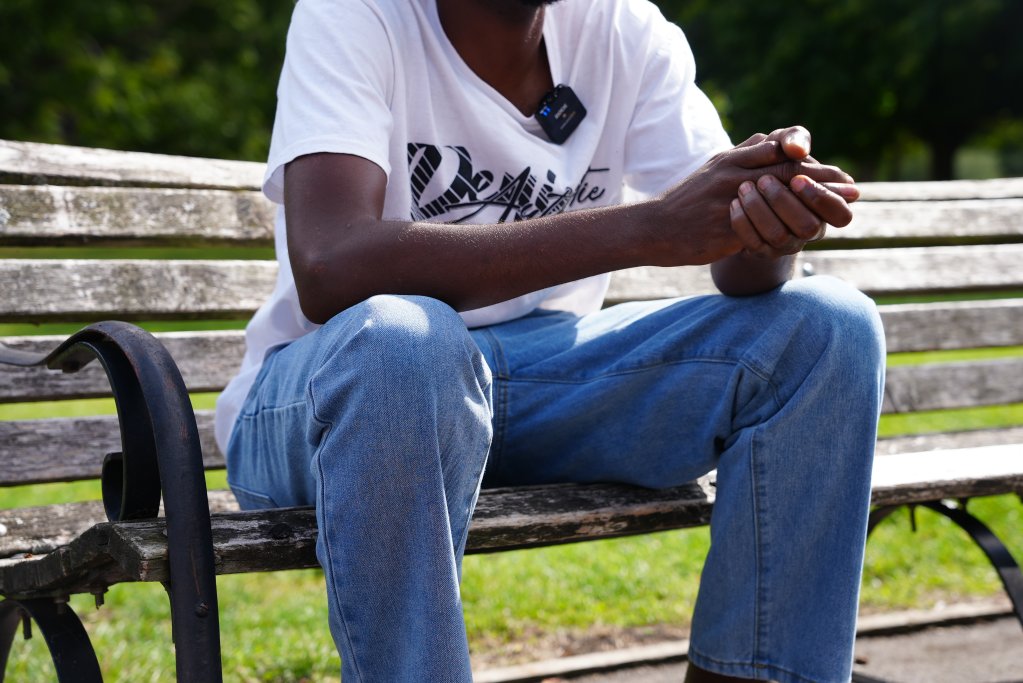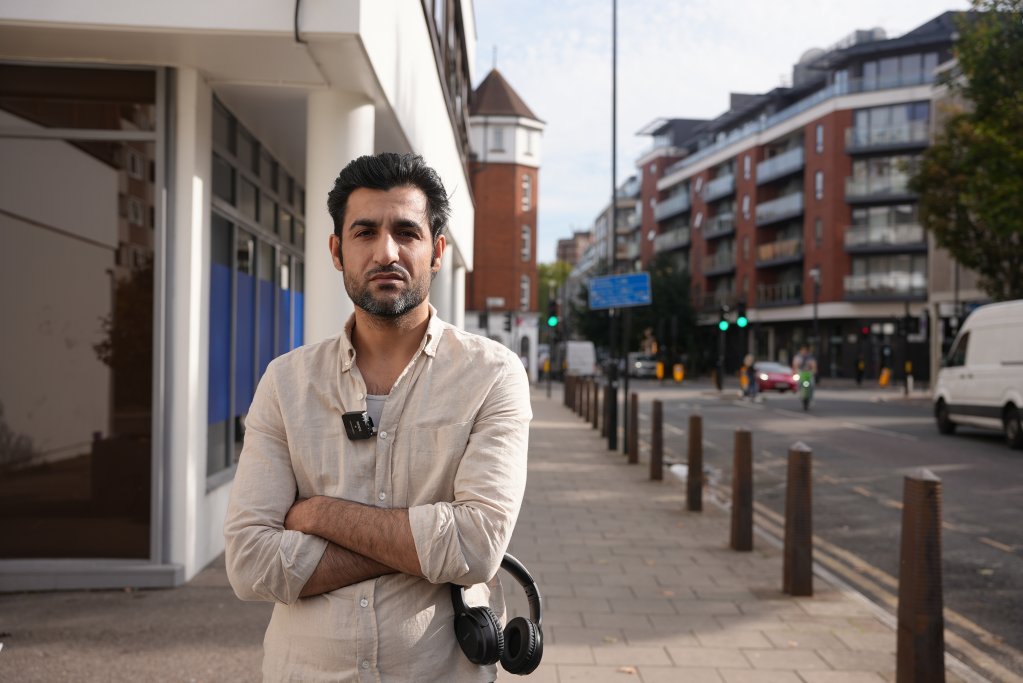Hotels housing asylum seekers across the UK have become a flashpoint for anti-migrant protests, with part of the British population angered over their usage. Although costly for the government, the solution remains widespread as migrant arrivals on small boats remain frequent.
To enter the hotel in Warwick, asylum seekers must stand before a fence and wait for a security guard to let them inside. The press is kept at a distance, and curious passersby are asked to move along.
Since the start of anti-migrant protests in the UK in mid-July, hotels housing asylum seekers have been targeted by protesters supported by the British far-right.
The most recent spate of demonstrations were sparked when an Ethiopian asylum seeker was arrested on charges of sexually assaulting a 14-year-old girl in early July in Epping, a suburb north of London. The people who took to the streets blamed their government for creating insecurity by accommodating migrants in hotels, and for resorting to hotels to house asylum seekers more and more often.

Contingency accommodation needed 'from 2020 onwards'
Sophie Watt, a researcher specializing in migration at the University of Sheffield, explained that the British government "faced a significant need for emergency accommodation from 2020 onwards." It was around this time that the phenomenon of "small boat" crossings in the Channel, which began in 2018, was on the rise. As a result, the number of irregular arrivals in the UK rapidly increased and reached record-high levels in the first half of 2025.
"At the end of the first quarter of 2020, only 5 percent of asylum seekers were housed in contingency accommodation, but by March 31, 2025, almost a third were staying in such facilities, mostly hotels," noted an August report released by The Migration Observatory at the University of Oxford.
The peak in the use of hotels as emergency accommodation for asylum seekers occurred in 2023, during former prime minister Rishi Sunak’s term. Over 55,000 asylum seekers were housed in some 400 hotels at the time.
Today, approximately 32,000 asylum seekers (or 30 percent of all asylum seekers in the UK) are housed in some 200 hotels.
Hotels that generate exorbitant profits
The United Kingdom is an outlier in Europe with its system of housing migrants. "Although many countries started to use temporary forms of accommodation since 2015 in order to deal with rising numbers of asylum seekers, such as sports and event halls, former school buildings, boats, and hotels, the UK stands out among European countries for transparently relying heavily on hotels for asylum accommodation," wrote The Migration Observatory in its report.
Unpopular with the British population for the supposed insecurity they create, hotels have also been criticized for their cost. "In 2024-2025, the average daily cost of housing an asylum seeker in a hotel can be estimated at the equivalent of 170 pounds per person (around 196 euros), compared to 27 pounds (around 31 euros) for other types of accommodation – over six times more expensive," noted The Migration Observatory.
The United Kingdom, unlike France or Spain, for example, has chosen to entrust the management of this accommodation to private companies. "The government subcontracts the management of the hotels to four business conglomerates (Clearsprings, Mears, Serco, and CTM), which make huge profits," said Watt.
In a recent report, the British public spending watchdog, the National Audit Office (NAO), highlighted the staggering cost of the hotels because of the profits made by these private companies. NAO noted that Clearsprings, Mears and Serco had made a total profit of 383 million pounds (around 443 million euros) between September 2019 and August 2024.
Hotels in poor condition and spoiled food
Yet, contrary to certain preconceptions, none of the hotels offer luxury services. "Standards vary greatly from one hotel to another, but there is nothing luxurious about them, since the goal is to make a profit. Some are therefore in poor condition and are not restored," said Watt.
Food quality has also been an issue, since it is relatively easy to reduce expenses in this domain. Several health scandals related to the food served in these hotels were revealed by the British press in recent years. Sky News reported on how asylum seekers staying in a hotel in November 2022 were skipping meals to avoid getting sick. The BBC reported on the quality of the food served to asylum seekers in March 2024: "Asylum seekers are being left malnourished, and in some cases, hospitalized due to rotten or contaminated food provided by the Home Office."
Khaled*, 24, has been staying in a hotel in Warwick for two months. Interviewed by InfoMigrants in a city park, he said he didn't like the food served there but was generally satisfied with the accommodation. The young man had previously been living in precarious conditions for over three months in camps located along the French coast.

Khaled even appeared detached from the living conditions in the hotels. Perhaps because he had already experienced so many difficulties and traumas. He decided to flee the Sudanese region of Darfur with his family for neighboring Chad, then spent several months alone in Libya before crossing the Mediterranean to Europe. "Compared to Libya, nothing is difficult now," he said with a laugh. The young man did not want to elaborate on what he endured, simply saying, "violence was everywhere."
Yet, he would have reason to complain, with the racism he experienced in Warwick. The wave of anti-migrant protests this summer has sometimes unleashed racist rhetoric in this small, predominantly conservative town. Khaled remembered being insulted in the street while walking with other migrants. "We were told 'Go home,' and there were also other insults that I don't want to repeat."
In London's Bethnal Green neighborhood, Khrosh lives in a hotel housing 600 asylum seekers. Residents regularly protest in front of their hotel. "These protests make me feel uneasy. Refugees already have a lot of difficulties and find themselves all alone, and these protests add to the problems," said the Iranian asylum seeker.
"It makes me feel bad, but it doesn't change my everyday life [...] But in the hotel, there are others who are afraid and don't go out anymore," he added.

Accommodation classified as 'quasi-detention'
Despite their shortfalls, hotels are a contingency solution for lack of anything better. Other options, like military sites or barges, such as the Bibby Stockholm barge, have proven to be much worse for asylum seekers. These sites are often very isolated and amount to "quasi-detention," according to the NGOs working there.
The mental health of men housed at the Wethersfield air base was worsening, according to a December 2023 report released by the Helen Bamber Foundation. The men held there reported experiencing: "loneliness, flashbacks, reduced appetite, weight loss, feelings of despair and difficulty sleeping, and a worsening in symptoms of Post-Traumatic Stress Disorder."
To appease the protesters, former British home secretary Yvette Cooper promised them that the hotels accommodating asylum seekers would be closed by 2029.
The government is now seeking other solutions to accommodate asylum seekers authorized to apply for international protection in the United Kingdom under the agreement with Paris. The use of former military sites is one of the options being considered by the authorities.
Read Also
Asylum seekers in the UK scapegoated amid economic precarity
